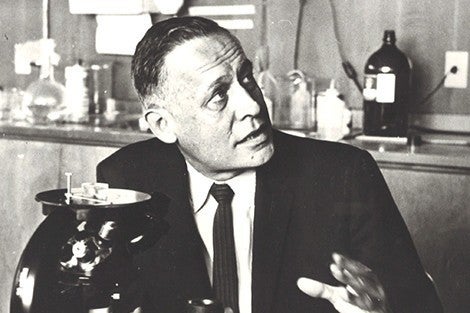When Roger Revelle took the helm of the new Harvard Center for Population and Development Studies (known as the Pop Center) in 1964, he was already one of the world’s most eminent and eclectic scientists.
His prominence in the climate-change conversation dated back to 1957, during his time as director of the Scripps Institution of Oceanography, when he co-authored a paper suggesting that oceans would absorb excess carbon dioxide generated by people at a much slower rate than previously predicted. Former U.S. Senator Al Gore, who had studied with Revelle in the 1960s, wrote about him admiringly in his 1992 best-selling book Earth in the Balance, crediting Revelle with inspiring his own future activism. In November 1990, the year before he died, Revelle received the National Medal of Science from President George H.W. Bush for, in Bush’s words, “being the grandfather of the greenhouse effect.”
As Pop Center director, Revelle brought together a team of colleagues dedicated to the problems of population growth and change. His focus was the plight of developing countries, and he strongly advocated enhancing education, agriculture, and industrialization in the developing world. For example, Revelle shared his insights about improved planting and irrigation methods, which reduced the salinization of Pakistan’s agricultural land and helped transform that country from a grain-importing nation to one with surplus grain to export—one of the most acclaimed successes of the 1960s “Green Revolution.”
Revelle also opposed biologists such as Paul Ehrlich, who had concluded that humans would breed themselves into catastrophe. The population problem, Revelle countered, couldn’t be separated from the problems of poverty and underdevelopment.
For all his awareness of impending challenges, Revelle—who, in addition to leading the center, was the Richard Saltonstall Professor of Population Policy until his retirement in 1978—was at heart an optimist. His answer to alarms about the “population bomb” was a broad agenda: feeding and caring for the growing numbers of humanity, especially those in the poorest parts of the globe. As he said in an interview with the Harvard Public Health Alumni Bulletin, “Because of the shrinking size of the world and its growing interdependence, and the fact that all the world’s resources are needed to support the world’s peoples, an effective way of distributing the world’s income more widely among nations must be found if there is to be world prosperity.”
Today, the University-wide Pop Center, directed by social epidemiologist Lisa Berkman, is carrying out Revelle’s vision, with a focus on social and environmental determinants of health, population aging, migration, and women’s health and fertility.
